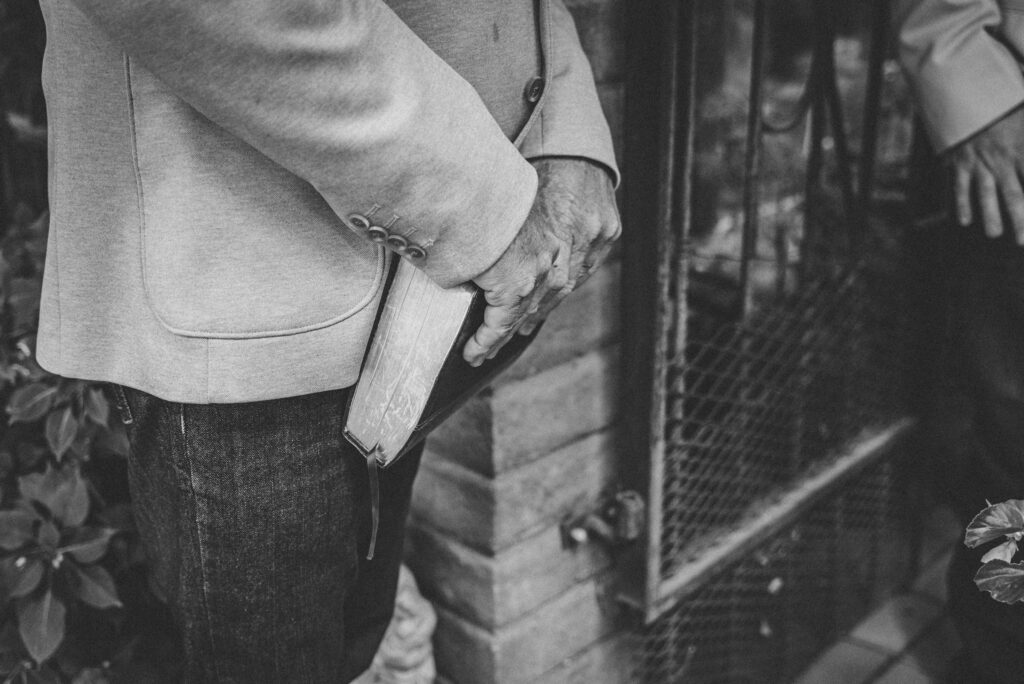This article is an edited version of the homily Rev. David Bisgrove gave at the memorial service of Cory Cates on June 1, 2024. Cory was 49 when his life ended suddenly. He is survived by his wife Kari Jo and four children: Nathan, Henry, Caroline and Betsy. He was an elder of Redeemer Presbyterian Church of New York City for over 20 years. As the loss of a family member or friend is an incomparably challenging circumstance for anyone, the Gospel in Life team felt the essence of this homily could be an encouragement to many.
Mark 14:12-16, 22-26
12 On the first day of the Festival of Unleavened Bread, when it was customary to sacrifice the Passover lamb, Jesus’ disciples asked him, “Where do you want us to go and make preparations for you to eat the Passover?”
13 So he sent two of his disciples, telling them, “Go into the city, and a man carrying a jar of water will meet you. Follow him. 14 Say to the owner of the house he enters, ‘The Teacher asks: Where is my guest room, where I may eat the Passover with my disciples?’ 15 He will show you a large room upstairs, furnished and ready. Make preparations for us there.”
16 The disciples left, went into the city and found things just as Jesus had told them. So they prepared the Passover.
22 While they were eating, Jesus took bread, and when he had given thanks, he broke it and gave it to his disciples, saying, “Take it; this is my body.”23 Then he took a cup, and when he had given thanks, he gave it to them, and they all drank from it.
24 “This is my blood of the[c] covenant, which is poured out for many,” he said to them. 25 “Truly I tell you, I will not drink again from the fruit of the vine until that day when I drink it new in the kingdom of God.”
26 When they had sung a hymn, they went out to the Mount of Olives.
This text demonstrates the emotional dissonance and seeming illogic of this scene—in many ways, similar to what we have experienced in the loss of Cory. What do I mean? For those who might not be familiar with Jesus’ story, he had spent the first 30 years of his life in obscurity, but when we find him here at the Last Supper, he had just spent the last 3 years of his life pursuing a very public mission. It was largely lived out among the marginalized of society and was a mission that subverted both the political and religious powers of his day, the climax of which was Holy Week, which includes the scene we see in this passage. The closer Jesus got to this moment, the more he talked about his death and that he was leaving his disciples. So here, they are gathering for a meal, shrouded in sorrow and grief with the shadow of death looming large—and they’re singing?

This is where the dissonance is—in this Passover meal. Passover was an annual celebration of the Jewish community. They celebrated the event that defined their identity. An event which is a reminder that they are favored and loved by God. That he rescued them out of Egyptian slavery. That they were led by God’s presence through a wilderness to a land of milk and honey. So in this meal of sorrow, grief, death and singing praise and gratitude—the Hallel (Hallelujah) in Psalm 118, repeating over and over again, we see the everlasting love of God with shouts of joy and victory.
With that song still ringing in their ears, Jesus and his disciples go out, and within a matter of hours, Jesus is arrested, tortured, falsely accused and convicted. He’s executed in arguably the most tortuous form of death ever conceived—nailed to a Roman cross for all to see. His followers are scattered and gone. Where’s the victory? Where’s the hallelujahs? Where’s the everlasting love of God? Where is His great faithfulness and amazing grace? It would seem that what has happened is just another righteous man unjustly eliminated by those in power.
Here’s where I want to draw a parallel for us. We are singing in the midst of sorrow—God’s faithfulness and amazing grace which we read in the bulletin that has the lyrics to the songs we sang today. It’s startling and finite that this beautiful human being was alive one day and gone the next. What do we do with this?
To help us navigate this dissonance, we have Cory to help us. Over 15 years ago, in what was the equivalent of a board meeting for what was Redeemer Presbyterian Church at the time, we were meeting to embark on an ambitious campaign to raise money and catalyze a vision for the city. I was brand new in my role and was told to give my “pitch” for the campaign. So I stood up before all these leaders, gave my pitch, and was finished when I heard a voice. It was Cory’s. Cory, with his PhD in physics, didn’t mince words. He stated very clearly: “I didn’t hear the gospel. Where’s the gospel?”
I did what every pastor does in that moment, I panicked. I recovered, and we went on to have a campaign that led with the gospel. But that’s the question I want us all to ask today: “Where’s the gospel?”
The word gospel in Greek means good news. So where’s the good news? The gospel is a history-altering event. But the question is one we all intuitively ask today. Where’s the good news in Israel and Gaza? Where’s the good news in the war in Ukraine? Where’s the good news in Haiti? Where’s the good news in NYC, where we see people sleep on the streets and busloads of people arrive with no money or homes. And, where’s the good news in our hearts? In our lives? Too often we are overwhelmed with shame. Regret. Sorrow.
“Every man has his secret sorrows which the world knows not; and oftentimes we call a man cold when he is only sad.” ―Henry Wadsworth Longfellow
Nicholas Wolterstorff, who was a professor of Philosophical Theology at Yale, wrote Lament for a Son. In it he writes about how his son died in a mountain climbing accident at 25. He states how the pain of the no more outweighs the gratitude of the once was. How can we sing in a world that reflects Edgar Allen Poe’s “The Raven”? The raven sits on the windowsill of the world and says, “NEVERMORE!” The raven presses the opposite of the “Hallelujah” we find said over and over throughout the Bible.
Where’s the good news in our hearts? In our lives? Too often we are overwhelmed with shame. Regret. Sorrow.
To honor Cory’s brilliant mind, his PhD in Physics, let’s look at the world’s primary operating system: the Second Law of Thermodynamics. I went on one website to review the three laws and remembered why I hated physics. So I’ll just boil down the math:
Second Law of Thermodynamics
The theory of entropy is that every system in the universe will naturally be found either in the state of maximum disorder, or moving towards it.
So for an example, just look at a piece of ice melting in a glass of hot water. It’s experiencing an increase in randomness and a parallel loss of information.
Or look at a 49-year-old man, alive one day, gone the next. In other words—where’s the good news? When we see a life ending prematurely, and we tend to think we live in a world where death gets the last word. Everyone of us is dying, like ice in hot water, and one day no one will remember our names.
We know this and yet we resist it. Why? Think about it this way. Of the approximately 16,700 memorial services happening today, why are we at this one? It isn’t death that has brought us together—it’s love. We grieve because no matter what we might believe about God or religion or physics, we know love is supposed to get the last word, not death. The French philosopher Albert Camus was getting at this idea in a quote Cory loved:
“In the midst of winter, I found there was, within me, an invincible summer. No matter how hard the world pushes against me, within me, there’s something stronger—something better, pushing right back.”
This idea is pushing back against entropy. It’s what Cory was pressing into that day when I made my presentation and he asked the simple question, “Where’s the gospel?” And it’s what we have to ask ourselves today. You can raise money to buy a building. You can have a big church or get your PhD in physics from an Ivy League school. You can have all kinds of success in this world. But in the end, if there isn’t a history-altering, life-changing event that is stronger than death, none of it matters. In physics you learn that it takes more energy to overcome entropy than the energy required to create disorder in the first place.
But in the end, if there isn’t a history-altering, life-changing event that is stronger than death, none of it matters.
And in that Last Supper of Jesus, in their sorrow and singing, we find the good news Cory referred to that day. Because it was the Last Supper for a world of nevermores, entropy, despair and death. Jesus was about to reverse that cosmic entropy through the most powerful energy in the world—divine love.

Jesus’ death was not a tragedy. At the beginning of the text in Mark 14, we see Jesus ask his disciples to go into the city, that a man carrying a jar of water would meet them. And it happened just as Jesus said! This was all part of a co-conspiracy of love by the Father, Son and Holy Spirit! Every page of the Bible points to the ultimate act of love—Jesus was going to be the Passover lamb, the mediator of God’s cosmic hospitality, by dying to set us free from all the regrets, sorrows, shame, guilt and brokenness of this world. To one day lead us home to an ultimate feast, to a land of milk and honey. This is the good news that we need to remember today.
This is where we come full circle, from all those years of serving the bread and cup in response to Jesus’ command—do it to REMEMBER HIM—because the death of Jesus was the death of death. So yes, we grieve today for the no more. But we grieve in hope. This is captured in the words of one of Cory’s favorite poets:
You must sit down, says Love, and taste my meat:
—George Herbert
So I did sit and eat.




